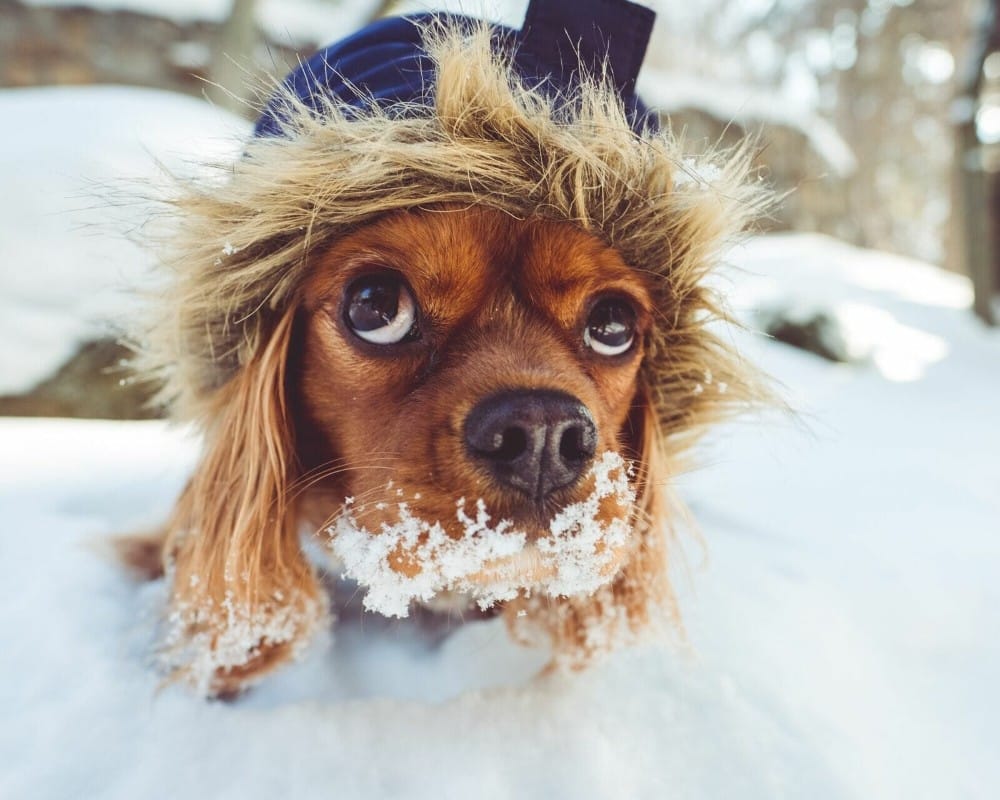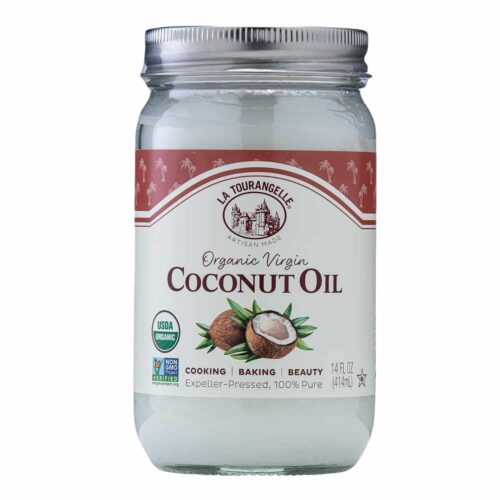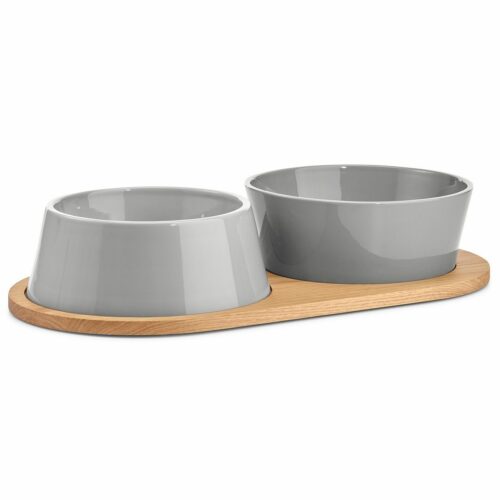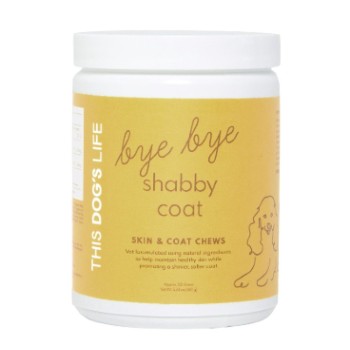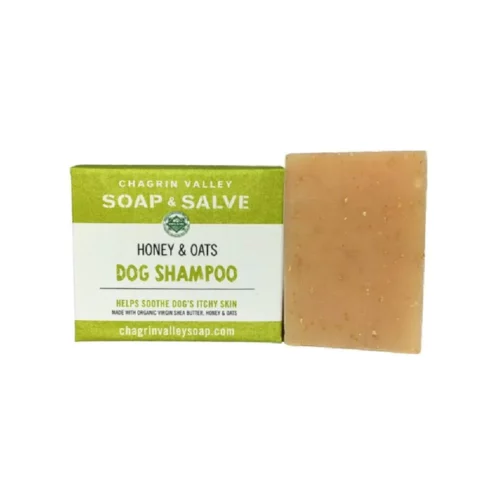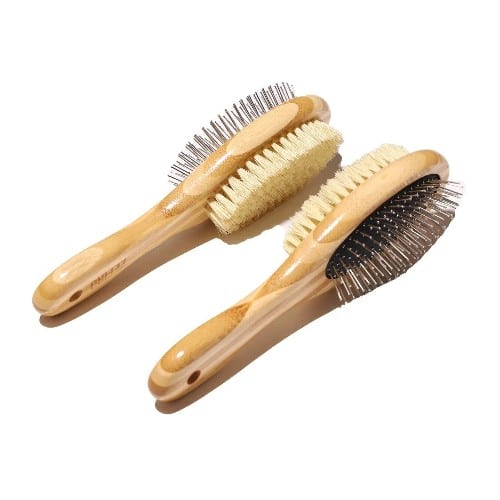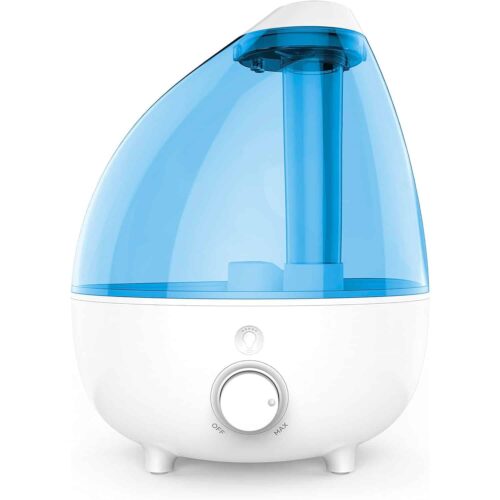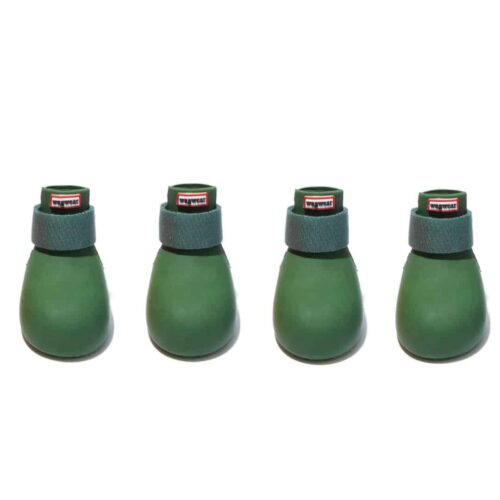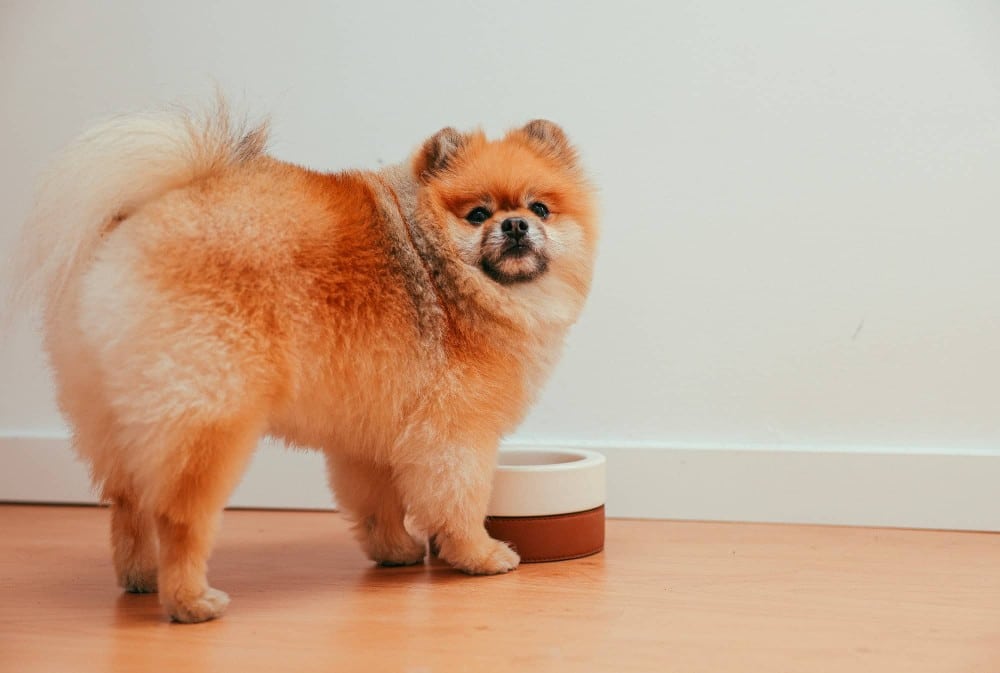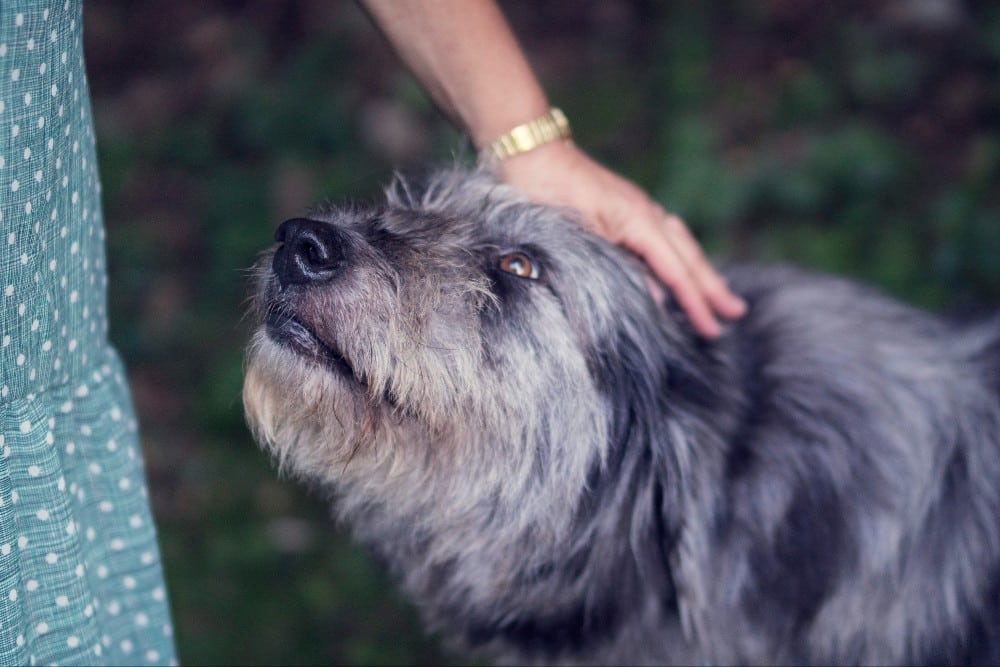Winter can be tough on skin and hair. The air outside is dry and windy, and the temperatures are frigid. Indoor heat leaches moisture from the body, making skin parched and turning hair into straw. We often change our skincare and use heavier shampoos and conditioner. But did you know that winter can also wreak havoc on our dogs?
In cold winter climates, dogs can suffer from itchy skin, dry fur, cracked paws and dandruff. Their coat can lack luster, and irritated skin can drive your dog crazy. If your pooch is scratching incessantly, he’s suffering.
Fortunately, there are ways to help your four-legged best friend. Here are some easy ways to keep your dog in tip-top cold weather condition.
This post contains products independently chosen (and loved) by our editors and writers. This Dog’s Life may earn a small commission on qualifying purchases of the products we link to.
1. Add Oil to Your Dog’s Diet
A great way to fix your dog’s outside is from the inside. And certain oils can do wonders on a dog’s skin and coat.
One being coconut oil due to having medium-chain fatty acids, like lauric acid, which are known for their ability to moisturize and enhance skin barrier function from within. This means that including a bit of coconut oil in your dog’s diet could help keep their skin supple and their coat shiny. Plus, it has antibacterial benefits, anti-inflammatory effects, may boost brain cognition, and digestion.
A tiny bit goes a long way. It is suggested to start with ¼ teaspoon for small dogs and for bigger dogs 1 tablespoon, and then gradually increase the dosage to 1 teaspoon per 10 pounds of body weight. If you have an overweight dog, dial back the amount you feed your pup.
Handcrafted with traditional French techniques in California and France, this sustainable and natural product infuses your furry friend’s coat with a silky shine and supports healthy skin from the inside out. (Price at time of publication.)
Keep in mind, while some deem coconut oil a “superfood,” it’s not all tail wags. It does high saturated fat content, which can be a concern for our four-legged besties. It may lead to weight gain and potentially impact heart health, so it’s a balance you’ll want to strike with care – and input from your veterinarian.
When purchasing coconut oil for your pup, look for unrefined, cold-pressed coconut oil. And if you don’t want to add to your dog’s diet, you can always put a little on your hands and rub on your dog’s skin and fur. (If your dog licks it off, it should be safe, unless, of course, your dog has an allergy to it.)
An alternative to coconut oil for diet is salmon oil, krill oil, flaxseed oil, and green lipped mussel oil.
2. Encourage Your Dog to Drink More Water
Keeping your dog well-hydrated isn’t just about quenching their thirst; it’s about keeping their skin and coat in peak condition. Water helps in maintaining the elasticity of the skin and regulates body temperature through the process of sweating and panting. When dogs are properly hydrated, their skin is less likely to become dry and flaky, and their coats are more likely to maintain that radiant glossy sheen. But it’s not just the quantity of water that matters; it’s the quality, too.
Why Fresh Water Matters
To entice your dog to drink more, keep his water dish clean and refill frequently with fresh, cool water. Not only does it taste delicious, but stagnant water in a dog’s bowl is a breeding ground for bacteria. Research has shown that biofilm in dog’s water bowls, a slimy substance that forms when bacteria adhere to surfaces in wet environments can lead to a host of issues, including infections and illnesses that can affect their skin and coat.
Made from high-quality porcelain, the minimalist, inverted shape was designed to stay firmly in position during mealtime. Not only will your dogs enjoy lapping up delicious fresh water, but they will look beautiful doing so.
Make sure you scrub your dog’s bowl every day with hot water using pet-friendly cleaners.
Filtered Water and Fountains
Some dogs may be picky drinkers because they’re turned off by the taste or smell of additives in tap water. Filtered or distilled water can be more appealing and encourage them to drink more. You can also invest in a filtered water fountain for your dog, as it will aerate the water, and a flowing stream of water usually entices your pooch to drink.
If your dog is super finicky, there are other creative solutions to keep your pup hydrated.
Water Additives for Dental Health
There are products designed to be added to your dog’s water that can promote dental health and, as a bonus, often come with flavors that make the water more enticing to your dog. These additives can help combat plaque and tartar while also keeping your pup hydrated.
Bone Broth: A Nutritious Twist
Bone broth is a tasty treat that’s rich in nutrients and moisture. Dogs love the yummy flavor (makes a great food topper), and it can provide hydration alongside a variety of health benefits. When making bone broth at home, ensure it’s free from onions, garlic, and excessive salt, which are harmful to dogs.
Dog-Friendly Hydration Boosters
Consider canine-friendly hydration boosters, which can be added to water to encourage dogs to drink more. These often contain flavors dogs love, such as chicken or beef, and can also include added electrolytes for hydration support.
Related: The 5 Best Water Purifiers to Protect Your Dog From Toxic Chemicals Coming From Your Faucets
3. Add Supplements for Healthy Coats and Supple Skin
A shiny coat and healthy skin are hallmarks of a well-nourished dog. One of the keys to achieving this is through the right balance of essential fatty acids in their diet.
The easiest way is by giving your dog a fatty acid supplemen, which can help alleviate many skin problems, including itchy skin and dry coats. Fatty acids are a type of polyunsaturated fat; the ones that are great for a dog’s coat (and other health benefits) are the omega-3s and the omega-6s.
The Power of Omega-3 and Omega-6
Omega-3 and Omega-6 fatty acids are essential components of cell membranes and are crucial for maintaining the health of your dog’s skin and coat. These polyunsaturated fats play a significant role in reducing inflammatory responses in the body.Inflammation can lead to skin issues, so by providing these fatty acids, you can help keep your dog’s skin less irritated and more resilient.
Omega-3 fatty acids, which include EPA (eicosapentaenoic acid) and DHA (docosahexaenoic acid), are found in cold-water fish, flaxseeds, and fish oil supplements. They are known for their anti-inflammatory properties.
Omega-6 fatty acids, on the other hand, are found in plant oils like safflower and sunflower oil, as well as poultry fat. They are essential for skin growth and repair, and while they can be pro-inflammatory, they are vital in the right balance.
Striking the Right Balance
It’s important to have a balance between Omega-3 and Omega-6 fatty acids. Too much Omega-6 can lead to inflammation, contributing to skin issues and other health problems. However, when balanced with Omega-3s, they work together to promote healthy skin and a glossy coat.
Choosing Between Liquid and Solid Chew Supplements
When it comes to supplements, you have options. Liquid supplements can be mixed in with your dog’s regular food and are often highly concentrated, meaning a small dose is packed with benefits. Liquid supplements especially good for precise dosing and for dogs that might be picky with their treats.
Solid supplements, such as chews or treats, can be convenient and often come with added flavors that dogs enjoy. They can be a good way to ensure your dog gets their daily dose without the mess of oils.
Bye Bye Shabby Coat nourishes your dog’s skin and coat from the inside out. Veterinarian formulated and using powerful natural ingredients, including healthy omegas, salmon oil, and vitamin E, our chews help heal dry, itchy, irritated skin, while also promoting a shinier and softer coat. All our supplements are proudly manufactured in the USA.
Look for Supplements Enriched with Additional Nutrients
In addition to Omega fatty acids, look for supplements that contain other skin-boosting ingredients, such as:
- Vitamin E: An antioxidant that helps protect the skin from oxidative damage and supports skin health.
- Flaxseed Oil: Rich in ALA (alpha-linolenic acid), a plant-based Omega-3 that can be converted into EPA and DHA in the body.
- Safflower Oil: A good source of Omega-6 fatty acids and can help nourish and maintain the skin’s barrier.
When selecting a supplement, make sure it’s formulated for dogs and check the dosage instructions to match your dog’s size and needs. And as always, consult with your veterinarian before adding any new supplement to your dog’s diet to ensure it’s appropriate for their health status and nutritional requirements.
4. Winter Bath Time: Tailored Care for Your Dog’s Coat
Winter brings its own set of challenges when it comes to keeping your dog clean and skin healthy. The combination of snow, salt, slush, and mud means you might need to adjust your pup’s bathing routine to keep their coat in tip-top shape without drying out their skin.
Understanding Your Dog’s Coat and Skin Needs
The type of coat your dog has can play a role in determining how often they need a bath during the winter months. Here are a few
- Oily Coats: Dogs like Basset Hounds, with naturally oily coats, may require more frequent bathing to prevent buildup and maintain skin health.
- Short-Haired Breeds: These breeds can often go longer between baths, as their coats don’t trap as much dirt and debris.
- Low-Riders: Breeds that are close to the ground, such as Dachshunds or Corgis, tend to pick up more dirt and may need more regular cleaning.
- Furry dogs: Breeds like Pomeranians or Bernese Mountain Dogs, which have thick, long coats, require regular grooming to prevent tangles and matting. Bathing every 4-6 weeks, with daily to weekly brushing, can keep their coats clean and reduce the need for more frequent baths.
- Double-coated dogs: Breeds such as the Siberian Husky have dense undercoats and guard hairs. They should be bathed only every few months, as overbathing can strip natural oils and cause dry skin. Regular brushing, especially during shedding season, is crucial to maintain their coat’s health and manage loose fur.
Choosing the Right Shampoo: Tailored Formulas
Selecting the right shampoo is crucial for maintaining the health of your dog’s skin and coat:
- For Itchy Skin: Look for shampoos with soothing ingredients like oatmeal or aloe vera, which can calm irritated skin.
- For Dry Skin: Moisturizing shampoos that contain natural oils or humectants can help replenish lost moisture.
- Hypoallergenic Options: If your dog has sensitive skin, hypoallergenic shampoos with fewer irritants are a safe choice.
- Deep Cleaning Needs: For dogs that get particularly dirty, a shampoo designed for deep cleaning without stripping natural oils is ideal.
For dogs with itchy, irritated skin, Chagrin Valley Soap & Salve’s Honey and Oats shampoo bar provides much-needed relief. Made with finely ground oats, honey, and cornstarch, the shampoo bar soothes dry skin while adding shine and moisture to the coat.
Remember, the goal is to clean your dog’s coat without removing the essential oils that protect their skin. Always avoid human shampoos as they are not pH-balanced for dogs and can damage their skin and coat.
Also, remember it is cold outside. If you give your dog a bath at home, make sure bathroom breaks are down before you scrub up your dog. Have extra towels on hand to get as much moisture out as possible and that your home is warm and cozy for dry off time.
Related: The Best Dog Shampoos You Can Make Right at Home
Maintenance Between Baths
Here are a few easy ways to keep your dog clean between baths:
- Grooming Wipes: Use dog-safe wipes to quickly remove dirt and debris after outdoor adventures.
- Regular Brushing: Brushing not only helps remove dirt but also distributes natural oils throughout the coat, maintaining its health and sheen.
Made with all-natural plant fibers, the sisal bristles gently pull loose hairs and adds shine while the wire bristles are best for thick fur and matted fur. The result: a shiny, healthy coat.
Consult a Professional
If you’re unsure about the best choice for your dog, consult a professional groomer or your veterinarian. They can provide recommendations based on your dog’s specific skin and coat type.
By understanding your dog’s unique needs and choosing the right products, you can ensure they stay clean and comfortable throughout the winter, with a healthy skin and a shiny coat to show for it.
5. Add a Humidifier to Your Home
Indoor heaters leech moisture from the air, leading to parched skin and dry, dull hair. That’s where a good humidifier comes in, helping your dog’s skin (and overall wellbeing) stay healthy. A humidifier adds moisture back into the air, creating a more comfortable environment for your dog. This added humidity can help keep your dog’s skin more hydrated and supple. It may also help alleviate a dog’s stuffy nose and congestion.
Choosing a Safe Humidifier for Pets
When selecting a humidifier for a home with pets, safety is a paramount concern:
- Cool Mist Over Warm Mist: Opt for a cool mist humidifier. Unlike warm mist humidifiers, they don’t pose a burn risk if your dog gets too close or accidentally knocks it over.
- Regular Cleaning: Ensure that the humidifier is cleaned regularly to prevent the growth of mold and bacteria, which can be harmful to both you and your dog.
- Appropriate Size: Choose one that’s the right size for the room. An overly humid environment can lead to its own set of problems, like mold growth.
Designed to moisturize the air for up to 24 hours, providing a soothing environment for both you and your dog, this cool-mist humidifier is perfect for rooms up to 500 square feet. The optional night light in calming colors, coupled with the safety of an automatic shut-off feature, makes this humidifier an awesome pick for for pet owners. (Price at time of publication.)
6. Paw Protection: Booties and Balms
A dog’s paws take a beating. In the winter, bare-paw walking for your dog can be extra dangerous. The combination of cold surfaces, salt, and ice can be harmful to your dog’s paws. Salt used for de-icing can burn their pads and may be toxic if ingested if they lick their paws. Ice and snow can also lead to cuts or the lodging of ice crystals between paw pads, causing frost bite, discomfort, or injury.
Navigating Winter with the Right Booties
When selecting booties, consider the following:
- Material: Look for waterproof or water-resistant materials to keep paws dry.
- Sole: Durable, non-slip soles are crucial for traction on icy surfaces.
- Fit: Ensure the boots fit snugly but not too tightly. There should be a little wiggle room for the toes, but the boots should not rotate or slip off easily.
- Style: From lightweight designs like Wagwear or Pawz to more protective options like Ultra Paws, and even performance-oriented Ruffwear boots for active dogs, there’s a style to suit every dog’s lifestyle and needs.
Once you found your perfect pair, getting your dog to comfortably wear boots can be a challenge. Start by measuring your dog’s paws according to the brand’s instructions to ensure a proper fit. Introduce the boots gradually, allowing your dog to get used to the sensation of wearing them.
Made of 100% rubber, the slip-on boots have open-vented slits, making it simple to slide on your pup’s paws. The rubbery material ensures the dog rain boots will stay secure, even when your dog is running. It’s the perfect paw protection for rainy or cold weather.
Paw Balms: A Soothing Alternative
Not all dogs tolerate boots — for some, they’re just not agreeable. If this is your pup, paw balms can be an option, providing a protective barrier against harsh conditions.
Look for balms containing ingredients like shea butter, coconut oil, and beeswax. These natural components are great for moisturizing dry pads and creating a protective layer against the elements. Note: Always patch-test products to ensure your dog doesn’t have an allergic reaction.
Related: Baby, It’s Cold Outside: How to Keep Your Dog Safe From the Deadliest Winter Dangers
By integrating these strategies into your dog’s routine, you can enjoy the winter months with a healthy dog, free of dry fur and damaged, itchy skin.













